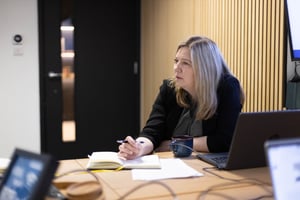Many thought-provoking questions were posed during our webinar about building better relationships...
Spokespeople are precious.
You need them to tell your story and make the most of media opportunities. And they are crucial for protecting your reputation when things go wrong.
It’s a tough job. But a good spokesperson can convince, compel, enthuse and add warmth, revealing a human side to an organisation.
But having good spokespeople is not enough.
As a comms professional, you need to have a relationship with them that can help them develop and deliver ever-improving interviews.
And, like all good relationships, that takes work.
Here are some tips and areas to focus on from our media training.
Individuals
It makes sense to have a pool of experienced spokespeople, all with recent media training, who you can call upon when you need them.
It helps to spread the workload and ensure you always have someone available for interviews despite illnesses, meeting clashes or holidays.
But you and your media team must understand them individually.
Each spokesperson will have their strengths, weaknesses, requirements and quirks.
Some may be naturally interested in the media and enjoy being part of it, while others could be more cautious and reluctant despite being subject experts.
Similarly, one spokesperson may feel more confident if they have a member of the comms team with them when they talk to journalists. And others may prefer to do interviews on their own.
Understanding how each spokesperson operates and what they feel they need to produce their best performance is crucial for ensuring they want to continue with the role. And it will result in better media interviews.
Motivation
Who are your organisation’s spokespeople, and why are they in the role? Is it because they reached a seniority level in their career which means the role came with the promotion?
Did they know they were going to have to talk to the media when they joined the company? Is it because you get on well with them and asked them to help? Or is it because they recognise the opportunity that raising their profile gives them?
An account manager told me a story about one of their customers recently. Apparently, she was particularly successful at persuading senior employees to have regular media training refresher sessions. What was the secret of her success? The spokespeople she worked with got promotions as their profile rose internally and externally within the industry.
So, talk to your spokespeople and understand what is motivating them to be spokespeople. Or are they just doing it because they have to?
If it is the latter, and you fear it is affecting their performance, then try and educate them on the merits of being involved. And, if this doesn’t work, then consider alternative spokespeople from within their team.
After all, in most instances, a journalist and the audience aren’t interested in business titles – only what the person and business they represent have to say.
Business buy-in, support and perception
Let’s assume you have a motivated and engaged team of spokespeople. Does the rest of the business support this comms strategy?
How do your spokespeople’s peers feel about them talking to the media? Have you asked them?
One thing to consider is how educating the rest of the business on the media outreach strategy can help your spokespeople. We recommend doing this at all levels of the business – board, director, management, team leader and below.
It means trying to get a seat at the table at departmental and monthly management meetings. It could also mean setting up a round-robin email communicating to the business what success you’ve had.
Whatever you do, be proactive, involve the internal comms team and use your PR and media skills to raise awareness of the work you and your spokespeople have been doing.
All of this outreach and media awareness comms is also an excellent opportunity for getting new story and case study ideas.
Feedback
Giving feedback to spokespeople is a crucial part of the interview process and improving media skills.
But it can be daunting, especially when those spokespeople are senior leaders. If the feedback has areas for improvement, it is only natural to worry about how it may be received or whether it might be held against you in future.
However, the crucial thing to remember is that most people want to get better and develop.
So, don’t shy away from providing feedback. Make sure it is timely. Don’t wait until their next media opportunity and then try to talk to them about something they did several weeks or months ago.
And make sure it is specific and based on examples. Broad observations, whether they are good or bad, offer little benefit.
It is also important to remember that we can’t change what has happened. So, feedback – despite its name – needs to focus on what should happen differently in the future and what worked well and should be used again.
Feedback is something we covered recently in more detail with business coaching expert Tienie Loubser. You can read his thoughts here.
Certainty and fairness
Two crucial things people crave are certainty and fairness.
They are covered in the SCARF model developed by leading human performance coach Dr David Rock, to detail the social factors that impact how people feel and behave within a team.
SCARF stands for Status, Certainty, Autonomy, Relatedness and Fairness, and it is something our sister company The BCF Group covers in its business coaching and management training courses.
Certainty and fairness can play an integral role in the relationship comms teams build with their spokespeople.
Certainty means ensuring your spokespeople are briefed on who they are speaking to and what they are discussing. And that they are confident about all the logistical details that can impact performance.
Where have they got to go? What time do they need to be there? In the age of remote interviews carried out on Zoom, do they know the meeting sign-in details? Do they need IT support to get Microsoft Teams working on their new laptop?
Small details that may sound insignificant, but certainty drifts away without them. And spokespeople can soon start to suffer from sweaty palms and begin to feel anxious.
To give you an example, in a previous role I was asked to put a spokesperson forward for a relatively straightforward interview. It was to be a down-the-line interview carried out from a remote studio in the north of England. That studio was effectively a shed, and the spokesperson had to let themselves in and operate the equipment themselves under the supervision of a remote technician.
Even though the spokesperson knew their subject inside out, I had more calls from them about that interview than any others because they felt uncertain about the setup and what they needed to do.
And because they lacked certainty, they were distracted and didn’t deliver as good an interview as they normally would.
Fairness, and its perception, is also crucial. And there are different aspects to it.
If we think about the logistics of an interview again, is it fair to expect a spokesperson to make their travel arrangements to get to a studio? Some probably wouldn’t be fussed, but others could well feel put out.
The other aspect of fairness centres on experience and comfort. If you have a spokesperson who has only given trade press interviews, or who feels most confident in that format, would it be fair to expect them to suddenly deliver a radio or television interview?
It would be a high-risk approach that, as well as feeling unfair, could go wrong and cause hesitation about putting themselves forward for interviews in the future.
A fair approach would be to see if they are willing to face that challenge and then offer media training so they have the tools to succeed.
Autonomy
I lied. The more I thought about it, the clearer it became there is a third part of the SCARF model that can help you build better relationships with your spokespeople – autonomy.
Presenting spokespeople with huge briefing documents and asking them to learn messages and the responses to questions leads to robotic performances.
But it is also an approach that suggests a lack of trust and is not rewarding.
Some autonomy is vital. Empower your spokespeople to put their spin on your messages and support it with their stories and anecdotes.
It will enable them to deliver more engaging interviews where their personality can shine through.
And because they feel trusted and end up enjoying the experience more, they will be more willing to do future interviews.
Other pressures
When you’ve secured an interview, you know it presents a great opportunity, and it becomes your priority.
But just because it is your focus does not necessarily mean it will feel the same for your spokesperson.
It is vital comms professionals don’t lose sight of the fact there are likely to be competing pressures.
It may not have the glamour of a TV or radio interview, but they could have a meeting they cannot get out of.
Rather than putting pressure on them to change their schedule and reluctantly commit to the interview – something unlikely to result in success - it may be better to work with them to identify an alternative time and see if the journalist has flexibility.
Alternatively, see if another suitable spokesperson on your roster has fewer time pressures and is more easily able and willing to do the interview.
Value
It can be easy to complete interviews and move on to the next task. After all, comms work is endless, and you often end the day with a longer ‘to-do’ list than you had at the beginning.
But it is important to stop, prevent it from becoming routine, and reflect on achievements.
Not just for our own sense of purpose, but also to ensure spokespeople remain motivated and understand the value of the interviews they are delivering.
We live in an age of results and metrics. So, dig out the results you use and show your spokespeople what their media interview work has achieved.
If you would like to find out more about some of the business coaching methods mentioned in this blog, take a look at the BCF Group’s website. And, get in touch with Media First if you need any help preparing your spokespeople for their next opportunity.




